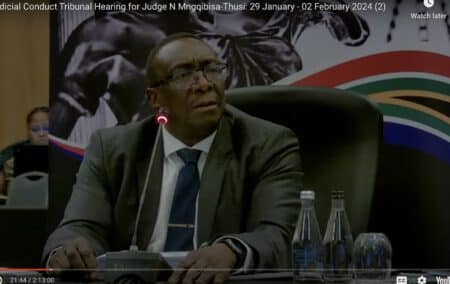The ‘question of African spirituality must be put on the judicial agenda’, traditional healer and spiritual leader Gogo Aubrey Matshiqi told a judicial conduct tribunal investigating the possible impeachment of Gauteng judge Nomonde Mngqibisa-Thusi.
The written submissions were released to the Sunday Times with the permission of the tribunal chair.
Mngqibisa-Thusi faces possible impeachment for 27 long-delayed judgments. It is the first judicial conduct tribunal dealing with long-delayed judgments as a possible basis for impeachment.
Mngqibisa-Thusi’s legal representative, Gauteng judge Gcina Malindi, referred to a global survey that explored the links between judges’ wellbeing and judicial integrity. The survey found that 92% of judges are ‘subjected to stress occasioned by excessive workloads’ and 68% of them feel that talking about it is ‘taboo’.
During the relevant period Mngqibisa-Thusi broke her elbow and writing wrist. Her husband got Covid-19, her mother fell ill and died, and her son struggled with addiction.
Another journal article quoted said women judges were particularly prone to stress, due primarily to family responsibilities.
Mngqibisa-Thusi had been struggling with a spiritual calling since the age of nine but had resisted it because of her strong Christian beliefs. Consequently, she suffered from ‘migraines, visions, nightmares, disorientation and mindlessness’.
Matshiqi argued that the Constitution, in reality, ‘belongs to those who conquered her, which has imposed a social, cultural and spiritual reality in which a numerical minority has become a cultural majority whose ways of being, seeing and doing … have become the dominant reality’.
She never said anything to Gauteng judge president Dunstan Mlambo, who could have alleviated her workload.
Evidence leader Adrian Mopp said she placed her own considerations above those of the litigants, failing in her professional duties.
[Photo: Screenshot of Gauteng Jude President’s evidence at Mngqibisa-Thusi’s impeachment hearing]


